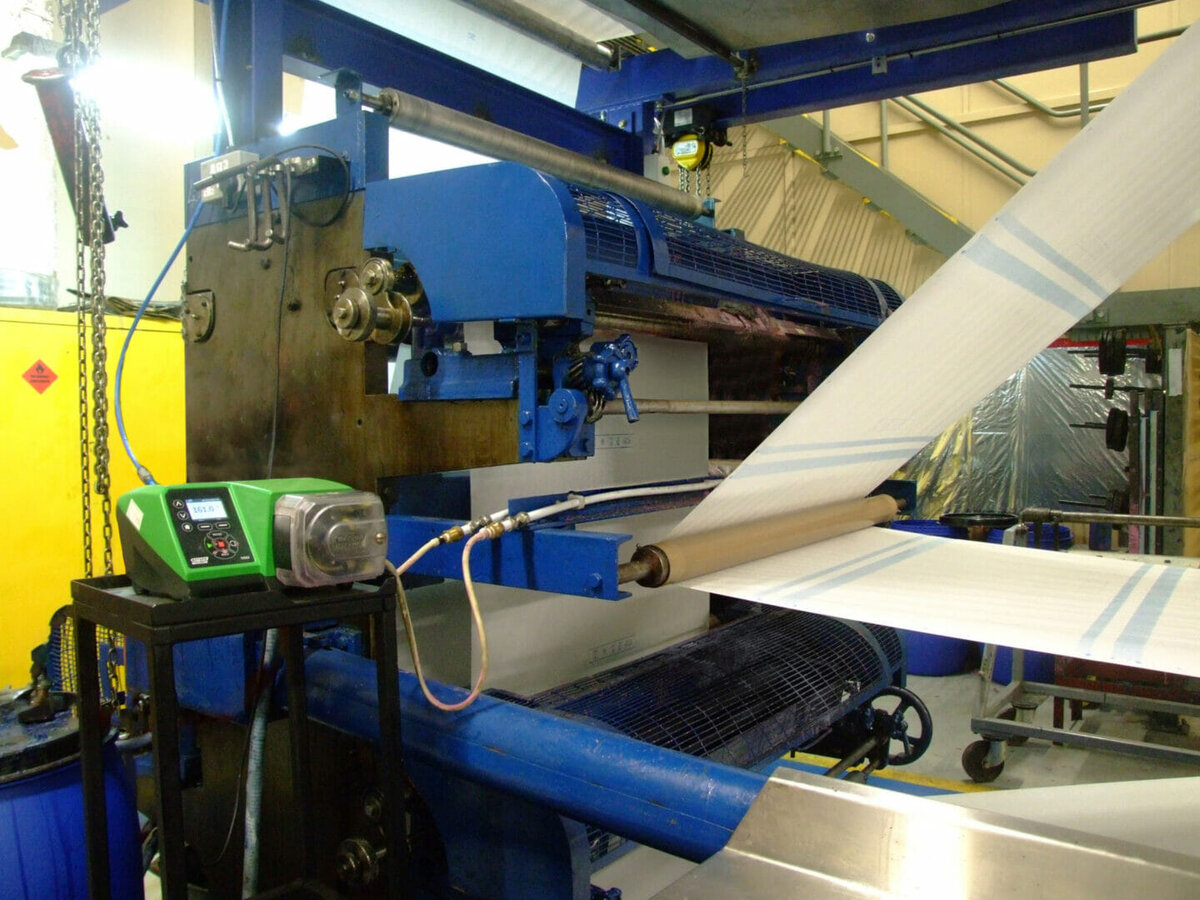Westfield Medical, a leading manufacturer of single-use packaging solutions for hospital sterilisation and medical device applications, has fitted six of its machines with 530UN/R2 peristaltic process pumps from Watson-Marlow Fluid Technology Group (WMFTG), which have replaced rotary pumps after repeated failures were encountered. The move has led to a significant reduction in downtime at the company’s Somerset facility near Radstock, and cut the cost of maintenance and replacement parts.
Established in 1984, Westfield Medical has grown to become a leading UK manufacturer of single-use sterilisation barrier systems with circa 120 employees. The company’s products include a comprehensive range of bags, pouches, reels, wraps, tray liners and accessories, which are used in over 90 countries worldwide.
Westfield Medical’s bespoke manufacturing service has been developed to produce specified sizes and special prints, as well as a range of products unique to the market, such as form fill and seal packaging, plain and printed sheet stock, and a complete range of plain and printed top and bottom webs.
With printing so critical to its customer offer, the company’s in-house manufacturing capability includes multi-colour flexographic printing, so that customer-specified designs can be produced on a variety of materials. These materials include plain, crepe, registered adhesive and all-over coated papers, coated and uncoated Tyvek®, and a variety of co-extruded and laminated materials.
Problematic ink marker
When packaged medical items are used, to ensure the necessary levels of sterilisation are achieved, a special ink marker is deployed as an indicator. However, with a viscosity higher than standard ink, the marker was proving problematic to pump on six bag production machines featuring flexographic printing capability.
“We were using rotary pumps, but unfortunately they began seizing on an increasingly frequent basis; in fact, we began encountering issues every month,” explains Ben Begue, Continuous Improvement Manager at Westfield Medical. “We experienced a particularly bad phase with the pumps in late 2018 and decided enough was enough. This led us to undertake some online research into alternative pumps, which in turn pointed to peristaltic technology.”
Westfield Medical contacted WMFTG and was recommended the 530UN/R2 process pump, one of which was supplied for a four-week trial.
“Even after the first week we could see that it would be successful,” says Mr Begue. “We returned after Christmas and the machine with the 530 series pump started up straight away, whereas the other five printing machines all needed pump repairs prior to starting. OK, the purchase price of the 530 pump is higher, but the savings associated with reduced downtime, maintenance and spare parts make the total cost of ownership [TCO] far less, especially across six machines.”
Six peristaltic process pumps
Westfield Medical made a commitment to buy six Watson-Marlow 530UN/R2 pumps, with the trial pump remaining on loan until deliveries commenced in March 2019.
Since installation of the six pumps, there have no reliability issues whatsoever, with the only replacement part being the Marprene tubing, which lasts about three months and takes just minutes to change. Westfield Medical runs two days shifts between 06:00 and 22:00 as standard, but transitions to 24/5 operations when demand dictates.
Peristaltic pumps are positive displacement pumps which contain the fluid being metered or transferred within a flexible tube. Rollers in the peristaltic pump compress the tube as they rotate, creating a vacuum which draws fluid through the tube. Nothing but the pump tube touches the fluid, eliminating the risk of the pump contaminating the fluid, or the fluid contaminating the pump. The animation shows fluid being drawn into a pump tube, trapped by the pumphead roller, and expelled when the next roller passes over the tube. As the rollers rotate, a vacuum is formed in the tube, pulling in more fluid, for the next roller pass. The complete closure of the tube when is it occluded (squeezed) between the roller and the track, gives the pump its positive displacement action, preventing backflow and eliminating the need for check-valves when the pump is not running. The pumps are virtually maintenance-free as there are no seals, valves, diaphragms or rotors to leak, clog or corrode.
At Westfield Medical, the 530UN/R2 pumps are used in continuous mode, although the actual flow rate is quite low. Since installation and set-up, each pump has been left to run day-in, day-out, without the need for any adjustment, even in hot weather, when the company dilutes the ink marker slightly to compensate for thermal effects.
Watson-Marlow 530 series pumps are intuitive, secure and maintain process integrity in applications with flow rates up to 3.5 l/min at 2 bar pressure. Various drive and pumphead options are available, along with a wide range of tube sizes and materials.
More applications
As a result of the success achieved with the 530 series pumps, Westfield Medical will shortly embark on a trial with a larger 730 series pump on one of its bag production machines.
“The machine uses an air-operated diaphragm (AOD) pump to apply glue that seals the bottom of the bag,” explains Mr Begue. “However, we’re having trouble with the actual diaphragm, which is perishing. Although we are not quite ready yet, we’re very keen to try the 730 series pump from Watson-Marlow, for which we have high hopes.”
All products at Westfield Medical are produced in a controlled manufacturing environment under the company’s ISO 9001:2015 and ISO 13485:2016 approved quality system, and meet all applicable European standards, such as BS EN 868 parts 2-10. In addition, the company is one of the few that can still supply sterilisation bags, pouches and reels with a British Standards Kitemark.








